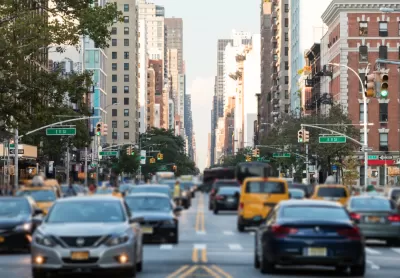New York's constitution guarantees New Yorkers the right to clean air and a healthy environment. Can this provision be used to fight the state's attempt to stop congestion pricing at the last minute?

In 2019, the New York state legislature passed a law authorizing congestion pricing in parts of Manhattan. After years of environmental review, the plan was scheduled to go into effect this June 30. But at the proverbial last minute, New York Gov. Kathy Hochul announced plans to indefinitely delay congestion pricing after years of supporting this change. Apparently, this decision was made for purely political reasons; Gov. Hochul is a Democrat, and some Democrats fear that congestion pricing may make Republicans more popular in suburban congressional districts.
Congestion pricing, by making driving more costly, would almost certainly reduce congestion and pollution in Manhattan. To make matters worse, New York City’s transit agency was counting on congestion pricing revenues to bolster existing service and to add additional transit service. If the agency fails to find another revenue source, transit service is likely to deteriorate, causing additional automobile use and pollution.
One possible avenue for challenging Hochul’s proposal is New York’s “green amendment.” This amendment, enacted in 2021, provides that New Yorkers shall be “entitled to clean air and water, and a healthful environment.” As explained above, if the state abandons congestion pricing, Manhattan air is likely to become less “healthful.”
On the other hand, the right to a healthful environment is obviously not absolute; otherwise, the state would be compelled to outlaw all polluting industry. So where should courts draw the line?
New York’s green amendment has not yet been extensively litigated. However, Pennsylvania has a similarly worded amendment, and in the 2013 case of Robinson Township v. Commonwealth, the state Supreme Court enforced that amendment to prevent a state law preempting local regulation of fracking. The court relied not only on the environmental harm caused by natural gas drilling, but also on landowners’ reasonable expectations. The court explained that landowners had a reasonable expectation that they would not be neighbors to an energy production facility, and that the state’s law violated those expectations. In the 2017 case of Pennsylvania Environmental Defense Foundation v. Commonwealth, the court held more broadly that because the state’s green amendment created a right to clean air and water, “any laws that unreasonably impair this right are unconstitutional.”
The Pennsylvania cases suggest that congestion pricing supporters have two possible avenues of attack. First, they can argue that because of the years of planning that went into the congestion pricing project and because congestion pricing was only a few weeks away from its first day, New Yorkers had a reasonable expectation that it would come to pass. (However, this argument is more likely to be persuasive if plaintiffs can show that someone relied on the possibility of congestion pricing).
Second, and more plausibly, supporters of congestion pricing can argue that the state’s about-face on congestion pricing both impairs the right to clean air and is fundamentally unreasonable. As noted above, Gov. Hochul’s decision appears to have been based on political considerations rather than on any scientific or environmental claims.
Case law under Montana’s green amendment may also be instructive. In the 1999 case of Montana Environmental Information Center v. Department of Environmental Quality, the Montana Supreme Court used the green amendment to stop the state from allowing a mining company to discharge arsenic and zinc into state rivers. The court held that the amendment allowed such environmental harm only if a “compelling state interest” is involved — a standard that Gov. Hochul’s apparently political decision is unlikely to meet. On the other hand, the Montana case involves an obvious change to the environmental status quo, while Hochul’s congestion pricing flip-flop is merely a failure to improve the status quo. But it seems at least possible that the absence of congestion pricing will lead to policy changes that will lead to actual environmental deterioration (such as reduced transit service).
In sum, it seems to me that if New York courts are willing to apply case law from Pennsylvania and Montana, the state’s reversal on congestion pricing may be constitutionally questionable.

Planetizen Federal Action Tracker
A weekly monitor of how Trump’s orders and actions are impacting planners and planning in America.

San Francisco's School District Spent $105M To Build Affordable Housing for Teachers — And That's Just the Beginning
SFUSD joins a growing list of school districts using their land holdings to address housing affordability challenges faced by their own employees.

The Tiny, Adorable $7,000 Car Turning Japan Onto EVs
The single seat Mibot charges from a regular plug as quickly as an iPad, and is about half the price of an average EV.

Seattle's Plan for Adopting Driverless Cars
Equity, safety, accessibility and affordability are front of mind as the city prepares for robotaxis and other autonomous vehicles.

As Trump Phases Out FEMA, Is It Time to Flee the Floodplains?
With less federal funding available for disaster relief efforts, the need to relocate at-risk communities is more urgent than ever.

With Protected Lanes, 460% More People Commute by Bike
For those needing more ammo, more data proving what we already knew is here.
Urban Design for Planners 1: Software Tools
This six-course series explores essential urban design concepts using open source software and equips planners with the tools they need to participate fully in the urban design process.
Planning for Universal Design
Learn the tools for implementing Universal Design in planning regulations.
Smith Gee Studio
City of Charlotte
City of Camden Redevelopment Agency
City of Astoria
Transportation Research & Education Center (TREC) at Portland State University
US High Speed Rail Association
City of Camden Redevelopment Agency
Municipality of Princeton (NJ)



























